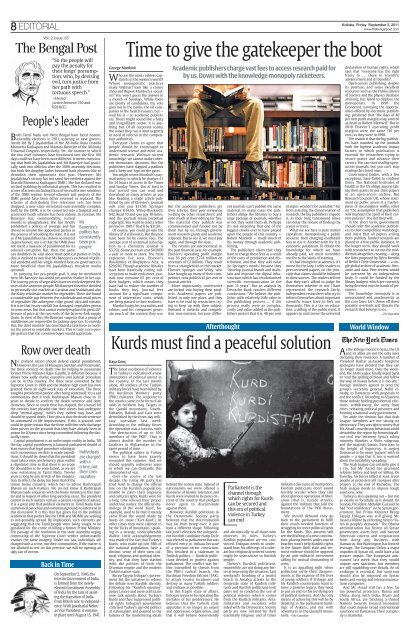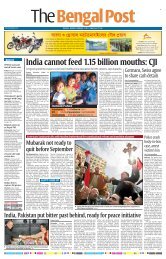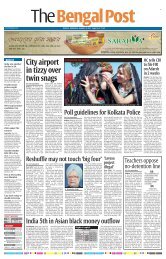02 page1 city layout 1
02 page1 city layout 1
02 page1 city layout 1
Create successful ePaper yourself
Turn your PDF publications into a flip-book with our unique Google optimized e-Paper software.
8<br />
EDITORIAL<br />
Vol: 2, Issue: 65<br />
“So the people will<br />
pay the penalty for<br />
their kings’ presumption,<br />
who, by devising<br />
evil, turn justice from<br />
her path with<br />
tortuous speech.”<br />
—Hesiod<br />
(active between 750 and<br />
650 BCE)<br />
People’s leader<br />
Both Tamil Nadu and West Bengal have faced historic<br />
assembly elections in 2011, ushering in new governments<br />
led by J. Jayalalithaa of the All-India Anna Dravida<br />
Munnetra Kazhagam and Mamata Banerjee of the All-India<br />
Trinamul Congress respectively. Yet, the manner in which<br />
the two chief ministers have functioned over the first 100<br />
days could not have been more different. It merits mentioning<br />
that both Ms Jayalalithaa and Ms Banerjee had practically<br />
sank into oblivion after the 2006 assembly elections,<br />
but both the doughty ladies bounced back phoenix-like to<br />
demolish their opponents this year. However, Ms<br />
Jayalalithaa’s victory has not sated her vendetta against the<br />
Dravida Munnetra Kazhagam (DMK). She has declared war<br />
on land grabbing by influential people. This has resulted in<br />
scores of arrests, including those of several former ministers<br />
of the DMK regime. Several schemes and projects of the<br />
DMK period have been either reversed or replaced. The<br />
scheme of distributing free television sets has been<br />
dropped, a new state secretariat-cum-assembly complex,<br />
built by the DMK, is to be converted into a hospital and a<br />
grassroots heath scheme has been redone. In contrast, Ms<br />
Banerjee has, commendably, turned<br />
swords to ploughshares. She has strictly<br />
prohibited a politics of revenge and has<br />
chosen to involve the opposition parties in<br />
the process of rebuilding the state. It is not<br />
as if Ms Jayalalithaa has shown no interest<br />
in governance; nor is it that the DMK does<br />
not merit a measure of punishment for its<br />
colossal corruption. But, then, the same<br />
can doubtless be said about most political parties in India.<br />
One is inclined to aver that Ms Banerjee’s eschewal of political<br />
vendetta and her single-minded focus on governance is<br />
more beneficial than Ms Jayalalithaa’s truculent modus<br />
operandi.<br />
In pursuing her pro-people goal, it may be mentioned<br />
here, Ms Banerjee has added yet another feather in her cap.<br />
The soaring prices of vegetables have recently deepened the<br />
woes of the common people. Ms Banerjee therefore decided<br />
to personally visit markets at Gariahat and Sealdah and also<br />
the Koley wholesale market for vegetables. There she found<br />
a considerable gap between the wholesale and retail prices<br />
of vegetables like aubergine, ridge gourd, okra and tomato.<br />
It is true that heavy rainfall has damaged vegetables grown<br />
in some areas. But that cannot entirely explain the great difference<br />
of price at the two ends of the farm-to-fork supply<br />
chain. In view of this, Ms Banerjee suspects that a group of<br />
middlemen are responsible for jacking up prices. To remedy<br />
this, the chief minister has constituted a task force to monitor<br />
the prices in vegetable markets. This is truly a pro-people<br />
gesture that the common buyer would appreciate.<br />
Row over death<br />
No civilised nation should defend capital punishment.<br />
However, the case of Murugan, Santhan and Perarivalan,<br />
the three convicts on death row for helping to assassinate<br />
former Prime Minister Rajiv Gandhi, is different because it<br />
shows how sadly clunky executive and judicial procedure<br />
can be in this country. The three were convicted by the<br />
Supreme Court in 1999 and the Madras high court has now<br />
granted them an eight-week stay of execution. The three<br />
sought a presidential pardon after being sentenced. It is a sad<br />
commentary that it took Rashtrapati Bhavan close to 12<br />
years to decide to confirm the death sentence and deny<br />
clemency. Since so much time has elapsed, the counsel for<br />
the convicts have pleaded that their clients had undergone<br />
deep “mental agony”, which they indeed may have, and<br />
should be spared death. Their plea is that the death sentence<br />
be commuted to life imprisonment. If this is granted, one<br />
could be quite certain that the three will then seek discharge<br />
from prison on the grounds that they have already been in<br />
prison for 20 years since being committed, following the dastardly<br />
crime.<br />
Capital punishment is an unfortunate reality in India. Till<br />
the day capital punishment is banned, parliament should at<br />
least ensure that legal procedure relating to<br />
such momentous verdicts is made expeditious.<br />
It should lay down that the president<br />
must take a view on clemency pleas within<br />
a stipulated time so that there is no scope<br />
for absurdities to be entertained, as we are<br />
now witnessing in Tamil Nadu. Twelve<br />
years is long by any stretch of the imagination.<br />
In effect, the delay has been that of the<br />
Union home ministry, which has to advise Rashtrapati<br />
Bhavan on such matters. We do not know if Rashtrapati<br />
Bhavan made enquiries with the home ministry in this matter<br />
and in respect of other long-pending cases. The president<br />
cannot in such matters remain a passive recipient of advice.<br />
It is a great pity that political elements in Tamil Nadu have<br />
summoned parochial and communal grounds to intervene in<br />
this discussion. It is this that has given rise to the political<br />
sentiment that parties like the DMK and MDMK are seeking<br />
to irresponsibly spread. By implication, such elements are<br />
suggesting that the Tamil people were being sought to be<br />
penalised for the crime of killing a former Prime Minister.<br />
The passage of the resolution in the state assembly urging<br />
commuting of the Supreme Court verdict unfortunately<br />
invokes the same imagery. Under our law, individuals are<br />
charged with a crime, not their communities. If the matter is<br />
not allowed to rest on this premise, we will be opening an<br />
ugly can of worms.<br />
Back in Time<br />
Ms<br />
Banerjee’s<br />
politics has<br />
consistently<br />
been propeople<br />
Individuals<br />
are charged<br />
with a<br />
crime, not<br />
their communities<br />
On September 2, 1946, the<br />
Interim Government of India<br />
is formed from the newlyelected<br />
Constituent Assembly<br />
of India for the task of assisting<br />
the transition of India<br />
from British rule to independence.<br />
With Jawaharlal Nehru<br />
as Vice President, it remains<br />
in place until August 15, 1947.<br />
Kolkata Friday September 2, 2011<br />
www.thebengalpost.com<br />
Time to give the gatekeeper the boot<br />
George Monbiot<br />
Who are the most ruthless capitalists<br />
in the western world?<br />
Whose monopolistic practices<br />
make Walmart look like a corner<br />
shop and Rupert Murdoch a socialist?<br />
You won’t guess the answer in<br />
a month of Sundays. While there<br />
are plenty of candidates, my vote<br />
goes not to the banks, the oil companies<br />
or the health insurers, but —<br />
wait for it — to academic publishers.<br />
Theirs might sound like a fusty<br />
and insignificant sector. It is anything<br />
but. Of all corporate scams,<br />
the racket they run is most urgently<br />
in need of referral to the competition<br />
authorities.<br />
Everyone claims to agree that<br />
people should be encouraged to<br />
understand science and other academic<br />
research. Without current<br />
knowledge, we cannot make coherent<br />
democratic decisions. But the<br />
publishers have slapped a padlock<br />
and a ‘keep out’ sign on the gates.<br />
You might resent Murdoch’s paywall<br />
policy, in which he charges £1<br />
for 24 hours of access to the Times<br />
and Sunday Times. But at least in<br />
that period you can read and<br />
download as many articles as you<br />
like. Reading a single article published<br />
by one of Elsevier’s journals<br />
will cost you $31.50. Springer<br />
charges €34.95, Wiley-Blackwell,<br />
$42. Read 10 and you pay 10 times.<br />
And the journals retain perpetual<br />
copyright. You want to read a letter<br />
printed in 1981? That’ll be $31.50.<br />
Of course, you could go into the<br />
library (if it still exists). But they too<br />
have been hit by cosmic fees. The<br />
average cost of an annual subscription<br />
to a chemistry journal is<br />
$3,792. Some journals cost $10,000<br />
a year or more to stock. The most<br />
expensive I’ve seen, Elsevier’s<br />
Biochimica et Biophysica Acta, is<br />
$20,930. Though academic libraries<br />
have been frantically cutting subscriptions<br />
to make ends meet, journals<br />
now consume 65 per cent of<br />
their budgets, which means they<br />
have had to reduce the number of<br />
books they buy. Journal fees<br />
account for a significant component<br />
of universities’ costs, which<br />
are being passed to their students.<br />
Murdoch pays his journalists and<br />
editors, and his companies generate<br />
much of the content they use.<br />
Academic publishers charge vast fees to access research paid for<br />
by us. Down with the knowledge monopoly racketeers.<br />
But the academic publishers get<br />
their articles, their peer reviewing<br />
(vetting by other researchers) and<br />
even much of their editing for free.<br />
The material they publish was<br />
commissioned and funded not by<br />
them but by us, through government<br />
research grants and academic<br />
stipends. But to see it, we must pay<br />
again, and through the nose.<br />
The returns are astronomical: in<br />
the past financial year, for example,<br />
Elsevier’s operating profit margin<br />
was 36 per cent (£724 million on<br />
revenues of £2 billion). They result<br />
from a stranglehold on the market.<br />
Elsevier, Springer and Wiley, who<br />
have bought up many of their competitors,<br />
now publish 42 per cent of<br />
journal articles.<br />
More importantly, universities<br />
are locked into buying their products.<br />
Academic papers are published<br />
in only one place, and they<br />
have to be read by researchers trying<br />
to keep up with their subject.<br />
Demand is inelastic and competition<br />
non-existent, because differ-<br />
Afterthought<br />
ent journals can’t publish the same<br />
material. In many cases the publishers<br />
oblige the libraries to buy a<br />
large package of journals, whether<br />
or not they want them all. Perhaps<br />
it’s not surprising that one of the<br />
biggest crooks ever to have preyed<br />
upon the people of this country —<br />
Robert Maxwell — made much of<br />
his money through academic publishing.<br />
The publishers claim that they<br />
have to charge these fees as a result<br />
of the costs of production and distribution,<br />
and that they add value<br />
(in Springer’s words) because they<br />
“develop journal brands and maintain<br />
and improve the digital infrastructure<br />
which has revolutionised<br />
scientific communication in the<br />
past 15 years”. But an analysis by<br />
Deutsche Bank reaches different<br />
conclusions. “We believe the publisher<br />
adds relatively little value to<br />
the publishing process … if the<br />
process really were as complex,<br />
costly and value-added as the publishers<br />
protest that it is, 40 per cent<br />
margins wouldn’t be available.” Far<br />
from assisting the dissemination of<br />
research, the big publishers impede<br />
it, as their long turnaround times<br />
can delay the release of findings by<br />
a year or more.<br />
What we see here is pure rentier<br />
capitalism: monopolising a public<br />
resource then charging exorbitant<br />
fees to use it. Another term for it is<br />
economic parasitism. To obtain the<br />
knowledge for which we have<br />
already paid, we must surrender<br />
our feu to the lairds of learning.<br />
It’s bad enough for academics, it’s<br />
worse for the laity. I refer readers to<br />
peer-reviewed papers, on the principle<br />
that claims should be followed<br />
to their sources. The readers tell me<br />
that they can’t afford to judge for<br />
themselves whether or not I have<br />
represented the research fairly.<br />
Independent researchers who try to<br />
inform themselves about important<br />
scientific issues have to fork out<br />
thousands. This is a tax on education,<br />
a stifling of the public mind. It<br />
appears to contravene the universal<br />
Kurds must find a peaceful solution<br />
Kaya Genç<br />
The latest escalation of violence<br />
in Turkey is indicative of a new<br />
atmosphere of political unrest in<br />
the country. In the last month<br />
alone, 40 soldiers of the Turkish<br />
military forces have been killed by<br />
the Kurdistan Workers’ party<br />
(PKK) militants. The response to<br />
the attacks came in the form of air<br />
raids in northern Iraq. Targets in<br />
the Qandil mountains, Sinath-<br />
Haftanin, Hakurk and Gara were<br />
demolished by the three-day military<br />
operation last week.<br />
According to the military forces<br />
the operation was a success, with<br />
“the destruction of up to 100<br />
members of the PKK”. That is<br />
almost double the number of<br />
fatalities in Afghanistan in the<br />
same period of time.<br />
The political sphere in Turkey<br />
seems to have been gravely<br />
wounded this summer. And we<br />
should urgently rediscover ways<br />
in which we can dismantle this<br />
atmosphere of war.<br />
Over the course of the last<br />
decade, the ruling AK party has<br />
tried hard to change the official<br />
line on the Kurdish population.<br />
Unable to claim their linguistic<br />
and cultural rights, Kurds were for<br />
a long time refused their proper<br />
and ethnic names: the official etymology<br />
of the word ‘Kurd’, for<br />
example, used to be that it merely<br />
came from the sound made by<br />
boots on snow (‘Kart-Kurd’). At<br />
other times they were claimed to<br />
be the Turks of mountains, speaking<br />
in a strange, undecipherable<br />
dialect. Little acknowledgement<br />
was made of the fact that Turkey’s<br />
Kurds, who make up one fifth of<br />
the national population, have a<br />
distinct sense of their own cultural,<br />
religious and political identity,<br />
and that they have clashed<br />
with the policies of both the<br />
Ottoman empire and the modern<br />
Turkish nation state.<br />
Recep Tayyip Erdogan’s government<br />
led the initiative to reform<br />
the debate over Kurdish identity.<br />
Following his “Kurdish opening”<br />
project, more and more politicians<br />
now talk openly about Turkey’s<br />
Kurds and their suppressed political<br />
rights. Erdogan’s government<br />
criticised Turkey’s age-old politics<br />
of nationalism and pointed to the<br />
failures of the modernising ideals<br />
behind the nation state. Instead of<br />
nationalism we were offered a<br />
discourse of Islamic tolerance and<br />
Kurds were invited to be pious citizens<br />
of the country that pledged<br />
never again to discriminate<br />
against them.<br />
However, Kurdish politicians in<br />
the Democratic Society party<br />
believed that the discrimination<br />
was far from being over: it just<br />
took a different shape. Following<br />
last June’s elections the independent<br />
Kurdish candidate Hatip Dicle<br />
was elected to parliament but was<br />
refused entry to Ankara because<br />
of a previous terror conviction.<br />
This resulted in a stalemate in<br />
Turkish politics — Kurdish politicians<br />
decided to protest against<br />
parliament. The conflict was further<br />
intensified by threats from<br />
the PKK’s radical branch, the<br />
Kurdistan Freedom Falcons (TAK),<br />
to attack tourist locations and<br />
destroy as many Turkish soldiers<br />
and civilians as possible.<br />
In this fragile state of affairs,<br />
Erdogan seems to be repeating the<br />
mistakes of his predecessors. He<br />
believes that the Turkish state<br />
apparatus is no longer an unjust<br />
and oppressive organisation, and<br />
that it will behave benevolently<br />
Parliament is the<br />
channel through<br />
which rights for Kurds<br />
can be secured and<br />
this era of political<br />
violence in Turkey<br />
can end<br />
and altruistically to all those who<br />
observes its rules. Turkey’s<br />
Kurdish population are not convinced.<br />
Erdogan needs to understand<br />
how his offerings of a tolerant<br />
but religiously ordered society<br />
might be unattractive to Kurdish<br />
people.<br />
Turkey’s Kurdish politicians,<br />
meanwhile, are not doing any better<br />
at improving the situation. Last<br />
weekend’s bombing of a tourist<br />
beach in Antalya attests to the<br />
desperate state of Kurdish militants<br />
and Kurdish politicians took<br />
pains not to condemn the use of<br />
political violence when it comes<br />
from the Kurdish militants. Antimilitarists<br />
and socialists who<br />
sided with the Democratic Society<br />
party are now irritated by their<br />
essentially religious and at times<br />
militarist discourse of martyrdom.<br />
Kurdish politicians don’t sound<br />
terribly secular when they talk<br />
about glorious operations of liberation<br />
(that is, suicide attacks)<br />
against the military that laid the<br />
foundations of the PKK movement.<br />
We should demand they go<br />
back to the parliament to fulfil<br />
their much-needed function of<br />
struggling for more political rights<br />
for the Kurds. This autumn will<br />
see the drafting of a new constitution:<br />
placing bombs under tourist<br />
beaches won’t help Kurdish rights<br />
in the future. Both state and terrorist<br />
violence should be opposed<br />
by an anti-militarist movement<br />
calling for mutual dismantling of<br />
arms.<br />
It is an appalling sight when<br />
politicians settle their disagreements<br />
at the expense of the lives<br />
of young soldiers. If Erdogan and<br />
his Kurdish counterparts want to<br />
leave a positive legacy, they need<br />
to put an end to this terrifying era<br />
of political violence. And the only<br />
means of achieving this will be by<br />
debating in the parliament buildings<br />
of Ankara, and not with<br />
adventures in the Quandil mountains.<br />
—The Guardian<br />
declaration of human rights, which<br />
says that “everyone has the right<br />
freely to … share in scientific<br />
advancement and its benefits”.<br />
Open-access publishing, despite<br />
its promise, and some excellent<br />
resources such as the Public Library<br />
of Science and the physics database<br />
arxiv.org, has failed to displace the<br />
monopolists. In 1998 the<br />
Economist, surveying the opportunities<br />
offered by electronic publishing,<br />
predicted that “the days of 40<br />
per cent profit margins may soon be<br />
as dead as Robert Maxwell”. But in<br />
2010 Elsevier’s operating profit<br />
margins were the same (36 per<br />
cent) as they were in 1998.<br />
The reason is that the big publishers<br />
have rounded up the journals<br />
with the highest academic impact<br />
factors, in which publication is<br />
essential for researchers trying to<br />
secure grants and advance their<br />
careers. You can start reading openaccess<br />
journals, but you can’t stop<br />
reading the closed ones.<br />
Government bodies, with a few<br />
exceptions, have failed to confront<br />
them. The National Institutes of<br />
Health in the US oblige anyone taking<br />
their grants to put their papers<br />
in an open-access archive. But<br />
Research Councils UK, whose statement<br />
on public access is a masterpiece<br />
of meaningless waffle, relies<br />
on “the assumption that publishers<br />
will maintain the spirit of their current<br />
policies”. You bet they will.<br />
In the short term, governments<br />
should refer the academic publishers<br />
to their competition watchdogs,<br />
and insist that all papers arising<br />
from publicly funded research are<br />
placed in a free public database. In<br />
the longer term, they should work<br />
with researchers to cut out the middleman<br />
altogether, creating — along<br />
the lines proposed by Björn Brembs<br />
of Berlin’s Freie Universität — a single<br />
global archive of academic literature<br />
and data. Peer-review would<br />
be overseen by an independent<br />
body. It could be funded by the<br />
library budgets which are currently<br />
being diverted into the hands of privateers.<br />
The knowledge monopoly is as<br />
unwarranted and anachronistic as<br />
the corn laws. Let’s throw off these<br />
parasitic overlords and liberate the<br />
research that belongs to us.<br />
—The Guardian<br />
World Window<br />
As the killings mount in Syria, the US<br />
and its allies are not the only ones<br />
declaring their revulsion. A number of<br />
President Bashar al-Assad’s longtime<br />
apologists have decided that they can<br />
no longer stand mute. Over the weekend,<br />
the Arab League finally urged Syria<br />
to “end the spilling of blood and follow<br />
the way of reason before it is too late.”<br />
Foreign ministers agreed to send the<br />
group’s secretary general, Nabil el-<br />
Araby, to Damascus with proposals to<br />
end the conflict. According to Al Jazeera,<br />
those include holding presidential elections,<br />
withdrawing the army from<br />
cities, releasing political prisoners and<br />
forming a national unity government.<br />
Set aside the obvious fact that Arab<br />
League members are not strong on<br />
democracy. They are right to worry that<br />
Mr. Assad’s murderous behaviour could<br />
destabilize the region by fomenting allout<br />
civil war between Syria’s ruling<br />
minority Alawites, a Shiite subgroup,<br />
and the majority Sunnis. Even Iran, in<br />
the height of hypocrisy, is urging<br />
Damascus to be more ‘patient’ with its<br />
people — a sign that it, too, is worried<br />
about the instability spreading.<br />
The Arab League can certainly give it<br />
a try, but Mr. Assad has promised<br />
reforms before and kept on killing. On<br />
Tuesday, his forces killed at least seven<br />
people as protesters left mosques after<br />
prayers at the end of Ramadan. The<br />
Arab League needs to impose tough<br />
sanctions, now.<br />
Turkey is also speaking out — but not<br />
as clearly or forcefully as it should. On<br />
Sunday, President Abdullah Gul said he<br />
had “lost confidence” in the Syrian government,<br />
but Prime Minister Recep<br />
Tayyip Erdogan was still giving Mr.<br />
Assad a lifeline by exhorting him to “listen<br />
to people’s demands.” The Obama<br />
administration has frozen all Syrian<br />
government assets here and banned<br />
American citizens and corporations<br />
from doing any business with<br />
Damascus. But Washington has limited<br />
leverage. The European Union, a major<br />
importer of Syrian oil, could have a far<br />
greater impact. The Europeans ann -<br />
ounced last week that they would<br />
impose new sanctions, but members<br />
are still squabbling over details. An oil<br />
embargo is essential, but sanctions<br />
should also be imposed on Syrian<br />
banks and energy and telecommunications<br />
companies.<br />
And Mr. Assad still has a few, far<br />
too powerful, protectors. Russia and<br />
China, along with India, Brazil and<br />
South Africa, are blocking a United<br />
Nations Security Council resolution<br />
that could impose broad international<br />
sanctions on Damascus. Their compli<strong>city</strong><br />
is shameful.












